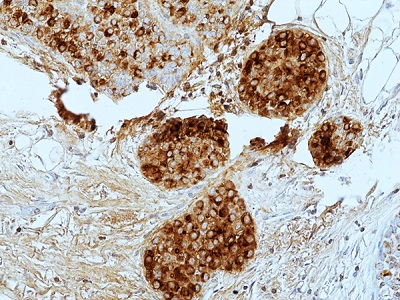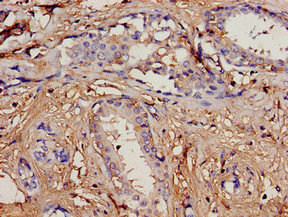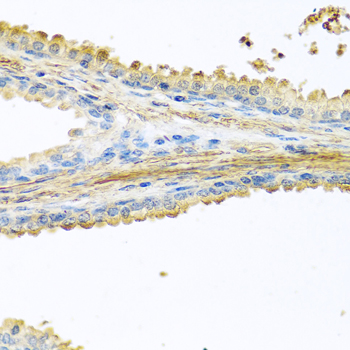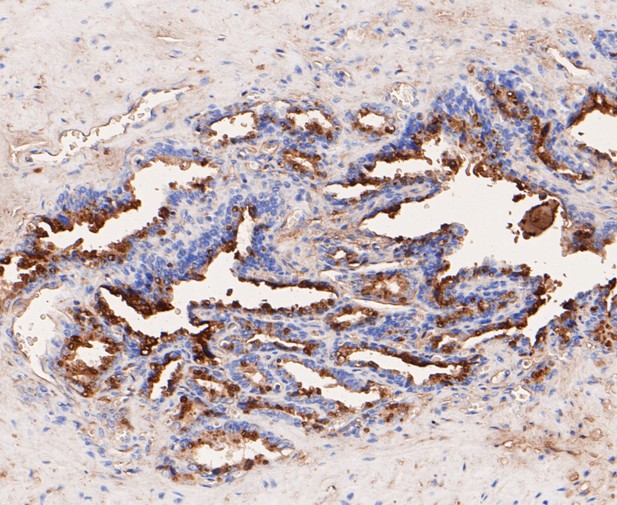
Immunohistochemical staining of formalin-fixed and paraffin-embedded human breast ductal cancer tissue sections using anti-GCDFP-15 Rabbit Monoclonal Antibody (RM504) at 1:100 dilution.
anti-GCDFP-15 (human), Rabbit Monoclonal (RM504)
REV-31-1396-00
ApplicationsWestern Blot, ImmunoHistoChemistry
Product group Antibodies
ReactivityHuman
TargetPIP
Overview
- SupplierRevMAb Biosciences
- Product Nameanti-GCDFP-15 (human), Rabbit Monoclonal (RM504)
- Delivery Days Customer10
- ApplicationsWestern Blot, ImmunoHistoChemistry
- CertificationResearch Use Only
- ClonalityMonoclonal
- Clone IDRM504
- Gene ID5304
- Target namePIP
- Target descriptionprolactin induced protein
- Target synonymsBRST-2, GCDFP-15, GCDFP15, GPIP4, prolactin-inducible protein, SABP, apocrine, gross cystic disease fluid protein 15, secretory actin-binding protein
- HostRabbit
- IsotypeIgG
- Protein IDP12273
- Protein NameProlactin-inducible protein
- Scientific DescriptionGross cystic disease of the breast is benign premenopausal disorder in which cysts are a predominant pathological lesion. These cysts appear to be formed from excessive apocrine cystic secretions. This fluid is composed of several glycoproteins including a unique 15kDa monomer protein, Gross Cystic Disease Fluid Protein-15 (GCDFP15). Cytosolic analysis of normal tissue specimens from all major organs has demonstrated GCDFP15 in apocrine epithelia, lacrimal, ceruminous and Molls glands and in numerous serous cells of the submandibular, tracheal, bronchial, sublingual and minor salivary glands. GCDFP15 and prostate specific antigen are co-expressed in androgen receptor-positive breast tumours making GCDFP15 a specific and sensitive marker for breast cancer. - Recombinant Antibody. This antibody reacts to human GCDFP-15. Isotype: Rabbit IgG. Immunogen: A peptide corresponding to the N-terminus of human GCDFP-15. Application: IHC, WB. Liquid. 50% Glycerol/PBS with 1% BSA and 0.09% sodium azide. Gross cystic disease of the breast is benign premenopausal disorder in which cysts are a predominant pathological lesion. These cysts appear to be formed from excessive apocrine cystic secretions. This fluid is composed of several glycoproteins including a unique 15kDa monomer protein, Gross Cystic Disease Fluid Protein-15 (GCDFP15). Cytosolic analysis of normal tissue specimens from all major organs has demonstrated GCDFP15 in apocrine epithelia, lacrimal, ceruminous and Molls glands and in numerous serous cells of the submandibular, tracheal, bronchial, sublingual and minor salivary glands. GCDFP15 and prostate specific antigen are co-expressed in androgen receptor-positive breast tumours making GCDFP15 a specific and sensitive marker for breast cancer.
- ReactivityHuman
- Storage Instruction-20°C,2°C to 8°C
- UNSPSC41116161









